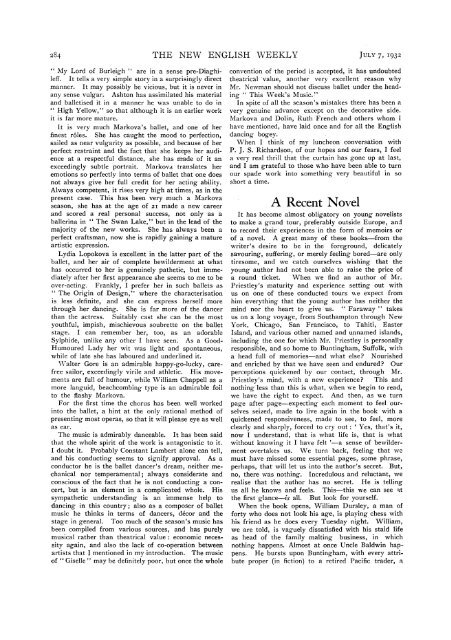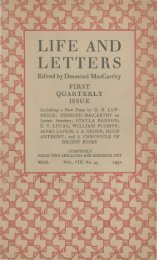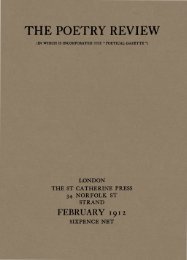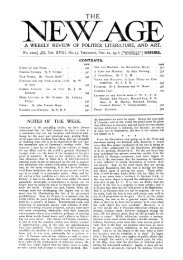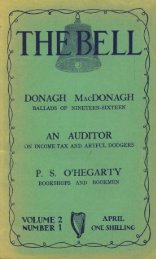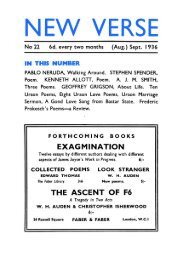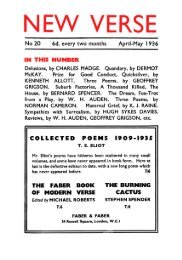Vol. I No. 12 - Modernist Magazines Project
Vol. I No. 12 - Modernist Magazines Project
Vol. I No. 12 - Modernist Magazines Project
You also want an ePaper? Increase the reach of your titles
YUMPU automatically turns print PDFs into web optimized ePapers that Google loves.
284 THE NEW ENGLISH WEEKLY JULY 7, 1932<br />
" My Lord of Burleigh " are in a sense pre-Diaghileff.<br />
It tells a very simple story in a surprisingly direct<br />
manner. It may possibly be vicious, but it is never in<br />
any sense vulgar. Ashton has assimilated his material<br />
and balletised it in a manner he was unable to do in<br />
." High Yellow," so that although it is an earlier work<br />
it is far more mature.<br />
It is very much Markova's ballet, and one of her<br />
finest roles. She has caught the mood to perfection,<br />
sailed as near vulgarity as possible, and because of her<br />
perfect restraint and the fact that she keeps her audience<br />
at a respectful distance, she has made of it an<br />
exceedingly subtle portrait. Markova translates her<br />
emotions so perfectly into terms of ballet that one does<br />
not always give her full credit for her acting ability.<br />
Always competent, it rises very high at times, as in the<br />
present case. This has been very much a Markova<br />
season, she has at the age of 21 made a new career<br />
and scored a real personal success, not only as a<br />
ballerina in " The Swan Lake," but in the lead of the<br />
majority of the new works. She has always been a<br />
perfect craftsman, now she is rapidly gaining a mature<br />
artistic expression.<br />
Lydia Lopokova is excellent in the latter part of the<br />
ballet, and her air of complete bewilderment at what<br />
has occurred to her is genuinely pathetic, but immediately<br />
after her first appearance she seems to me to be<br />
over-acting. Frankly, I prefer her in such ballets as<br />
" The Origin of Design," where the characterisation<br />
is less definite, and she can express herself more<br />
through her dancing. She is far more of the dancer<br />
than the actress. Suitably cast she can be the most<br />
youthful, impish, mischievous soubrette on the ballet<br />
stage. I can remember her, too, as an adorable<br />
Sylphide, unlike any other I have seen. As a Good-<br />
Humoured Lady her wit was light and spontaneous,<br />
while of late she has laboured and underlined it.<br />
Walter Gore is an admirable happy-go-lucky, carefree<br />
sailor, exceedingly virile and athletic. His movements<br />
are full of humour, while William Chappell as a<br />
more languid, beachcombing type is an admirable foil<br />
to the flashy Markova.<br />
For the first time the chorus has been well worked<br />
into the ballet, a hint at the only rational method of<br />
presenting most operas, so that it will please eye as well<br />
as ear.<br />
The music is admirably danceable. It has been said<br />
that the whole spirit of the work is antagonistic to it.<br />
I doubt it. Probably Constant Lambert alone can tell,<br />
and his conducting seems to signify approval. As a<br />
conductor he is the ballet dancer's dream, neither mechanical<br />
nor temperamental; always considerate and<br />
conscious of the fact that he is not conducting a concert,<br />
but is an element in a complicated whole. His<br />
sympathetic understanding is an immense help to<br />
dancing in this country; also as a composer of ballet<br />
music he thinks in terms of dancers, decor and the<br />
stage in general. Too much of the season's music has<br />
been compiled from various sources, and has purely<br />
musical rather than theatrical value : economic necessity<br />
again, and also the lack of co-operation between<br />
artists that I mentioned in my introduction. The music<br />
of " Giselle " may be definitely poor, but once the whole<br />
convention of the period is accepted, it has undoubted<br />
theatrical value, another very excellent reason why<br />
Mr. Newman should not discuss ballet under the heading<br />
" This Week's Music."<br />
In spite of all the season's mistakes there has been a<br />
very genuine advance except on the decorative side.<br />
Markova and Dolin, Ruth French and others whom I<br />
have mentioned, have laid once and for all the English<br />
dancing bogey.<br />
When I think of my luncheon conversation with<br />
P. J. S. Richardson, of our hopes and our fears, I feel<br />
a very real thrill that the curtain has gone up at last,<br />
and I am grateful to those who have been able to turn<br />
our spade work into something very beautiful in so<br />
short a time.<br />
A Recent <strong>No</strong>vel<br />
It has become almost obligatory on young novelists<br />
to make a grand tour, preferably outside Europe, and<br />
to record their experiences in the form of memoirs or<br />
of a novel. A great many of these books—from the<br />
writer's desire to be in the foreground, delicately<br />
savouring, suffering, or merely feeling bored—are only<br />
tiresome, and we catch ourselves wishing that the<br />
young author had not been able to raise the price of<br />
a round ticket. When we find an author of Mr.<br />
Priestley's maturity and experience setting out with<br />
us on one of these conducted tours we expect from<br />
him everything that the young author has neither the<br />
mind nor the heart to give us. " Faraway " takes<br />
us on a long voyage, from Southampton through New<br />
York, Chicago, San Francisco, to Tahiti, Easter<br />
Island, and various other named and unnamed islands,<br />
including the one for which Mr. Priestley is personally<br />
responsible, and so home to Buntingham, Suffolk, with<br />
a head full of memories—and what else? <strong>No</strong>urished<br />
and enriched by that we have seen and endured? Our<br />
perceptions quickened by our contact, through Mr.<br />
Priestley's mind, with a new experience? This and<br />
nothing less than this is what, when we begin to read,<br />
we have the right to expect. And then, as we turn<br />
page after page—expecting each moment to feel ourselves<br />
seized, made to live again in the book with a<br />
quickened responsiveness, made to see, to feel, more<br />
clearly and sharply, forced to cry out: ' Yes, that's it,<br />
now I understand, that is what life is, that is what<br />
without knowing it I have felt '—a sense of bewilder<br />
ment overtakes us. We turn back, feeling that we<br />
must have missed some essential pages, some phrase,<br />
perhaps, that will let us into the author's secret. But,<br />
no, there was nothing. Incredulous and reluctant, we<br />
realise that the author has no secret. He is telling<br />
us all he knows and feels. This—this we can see at<br />
the first glance—is all. But look for yourself.<br />
When the book opens, William Dursley, a man of<br />
forty who does not look his age, is playing chess with<br />
his friend as he does every Tuesday night. William,<br />
we are told, is vaguely dissatisfied with his staid life<br />
as head of the family malting business, in which<br />
nothing happens. Almost at once Uncle Baldwin happens.<br />
He bursts upon Buntingham, with every attribute<br />
proper (in fiction) to a retired Pacific trader, a


